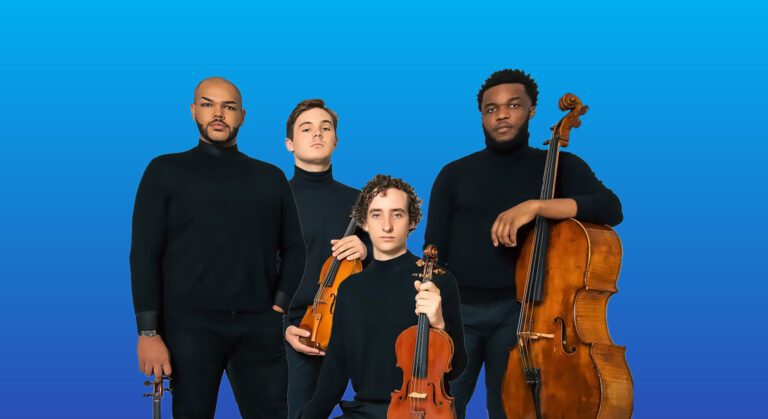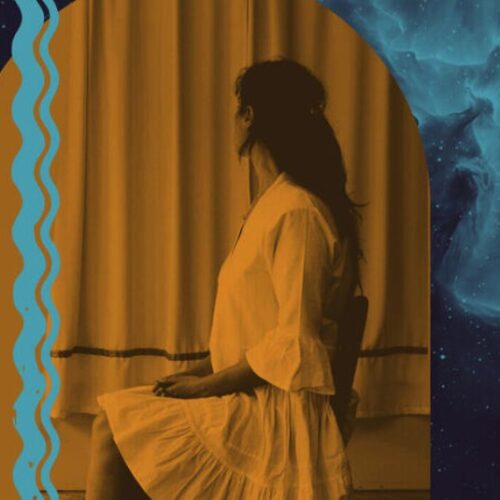Additional Information
New York’s Isidore Quartet, winners of the renowned Banff International String Quartet Competition 2022 and the Avery Fisher Grant 2023, arrive in Montreal for the first time this weekend. As part of the Montreal Chamber Music Festival, the ensemble founded in 2019 will play three times: Friday the 16th at noon in Salle Bourgie in a short concert lasting less than an hour, Saturday the 17th evening in piano quintet format, where they will be accompanied by the excellent, and Montreal local, Philip Chiu, and Sunday afternoon at the Maison symphonique with an entire string ensemble featuring Tchaikovsky!
Made up of Phoenix Avalon and Adrian Steele on violins, Devon Moore on viola and Joshua McClendon on cello, the ensemble has developed a reputation for exciting, clear and sincere playing. They’re also said to make classical music sound totally fresh with a relaxed approach to concert-going.
Why Isidore? Firstly, in recognition of Isidore Cohen, violinist of the famous Juilliard Quartet, an ensemble that inspires them, and secondly, humbly confessed, as a tribute to the Greek monk Isidore, who is said to have concocted the first real vodka in the Grand Duchy of Russia. The pleasure of music doesn’t have to come alone!
A chat with Devon Moore.
Pan M 360: Hello! It’s a pleasure to know you’ll soon be in Montreal!
Devin Moore (Isidore 4t) : Thank you! It’s a great pleasure for us to go there for the first time as an ensemble. It’ll be a first for me, but not for Adrian (the violinist) as his brother lives there.
Pan M 360: Banff and Avery Fisher are two very prestigious prizes. You were founded very recently (2019). Did you anticipate such a rapid rise when you started?
Devin Moore (Isidore 4t): No, we didn’t. We simply wanted to play music together in an official way because we were already doing it as students. When we applied to take part in the Banff Competition, we had no expectations. Then, when we were accepted in the competition, we realized that ”Oh, heck, we’ve got to learn a lot of music all of a sudden!” We had maybe five or six months of serious work as an ensemble, no more. So we worked very, very, very hard. It was a fantastic experience, very exciting, but perhaps the most stressful of my life!
Pan M 360: What does this First prize in Banff mean to you?
Devin Moore (Isidore 4t): It’s a big deal. Right after we played our program for the finals, a guy came and offered to represent us as an agent. We hadn’t yet received the announcement of victory. It was an exceptional contest. I remember admiring several of the quartets that took part (the Schumann, the Dover, etc.). The mere fact of being admitted was a great validation of our work and vision.
Pan M 360: On your website, you state that your mission is to “revisit, rediscover and reinvigorate” the repertoire. How do you go about this?
Devin Moore (Isidore 4t) : We’re inspired by the vision of the Juilliard Quartet, one of the great ensembles of the 20th century. Collectively, the four of us have studied with eight or nine current or former members of this quartet! Their philosophy has always been to treat the new as if it were old, and the old as if it were new. We like to treat the repertoire as if it were an open playing field. Take Haydn, for example, which we love. We take a very sincere but passionate approach. We love the great repertoire and, even though I’m the oldest, at 24, and even though I sometimes think we have no idea what we’re doing (laughs), we dive right in and express what we feel for this music, without filter, without restraint.
Pan M 360: The benefit of youth… Since you’re so young, how do you think you can convince people of your generation to come to classical concerts?
Devin Moore (Isidore 4t) : What we want most is to connect and communicate closely with audiences, young and old. Although we love to play in traditional concert halls, we also don’t hesitate to play in art galleries, or in other contexts where people may well be lying down or sitting on sofas, talking a bit during the concert, having a glass of wine, etc. These are contexts in which we can adapt very well. I think it allows us to reach a different, often younger, audience. We’ve been to concerts, we’ve learned to sit up straight, to be quiet, not to applaud between movements, but for many people it’s intimidating. But it’s not the manners that count, it’s the appreciation of the music!
Pan M 360: You are socially committed. You’re involved in a project called Music Heals Us. What is this initiative and why are you involved?
Devin Moore (Isidore 4t) : It’s a non-profit organization that brings music to people who don’t have access to it for all sorts of reasons. We go into hospices, health care centers, prisons and so on. It’s a program run by Molly Carr, the Juilliard Quartet’s current violist. She was my teacher and shortly after we formed as a professional ensemble, she contacted us to participate. In all honesty, it’s one of our favorite activities. They are simply unforgettable human experiences. I remember clearly one time, we went to give a concert in a prison in the Bronx. We arrive there with our instruments, set up and start playing. A few people approached, then several more and more again. They start asking us questions, and we start talking and chatting. And then this man comes along and tells us he writes rap lyrics, and asks if he can sing them for us. We went along with him, underscoring him with rythms, and it lasted about twenty minutes! It was one of the best experiences we’ve ever had. Winning a competition like Banff is fantastic and very important, but the primary aim of our passion is to create sincere contact with other people, and Music Heals Us gives us the opportunity to make human encounters of a totally different and deeply sincere nature, in totally unexpected contexts. It’s very powerful.
Pan M 360: You’re active on the contemporary music scene. Do you focus on any particular type of new music?
Devin Moore (Isidore 4t) : For my part, I started a non-profit organization with a colleague with the goal of playing more music by composers from groups underrepresented in classical music. For example, black composers, female composers or also works by artists from other musical genres, such as the string quartets of Billy Childs, a great jazz musician who has won several Grammy awards, but whose work in classical music is not well known. It’s extraordinary music. Every time we play it, people fall in love with it.
Pan M 360: Thank you very much, and we can’t wait to hear you in Montreal!
Devin Moore (Isidore 4t): Thank you very much, and we’re looking forward to it too!























